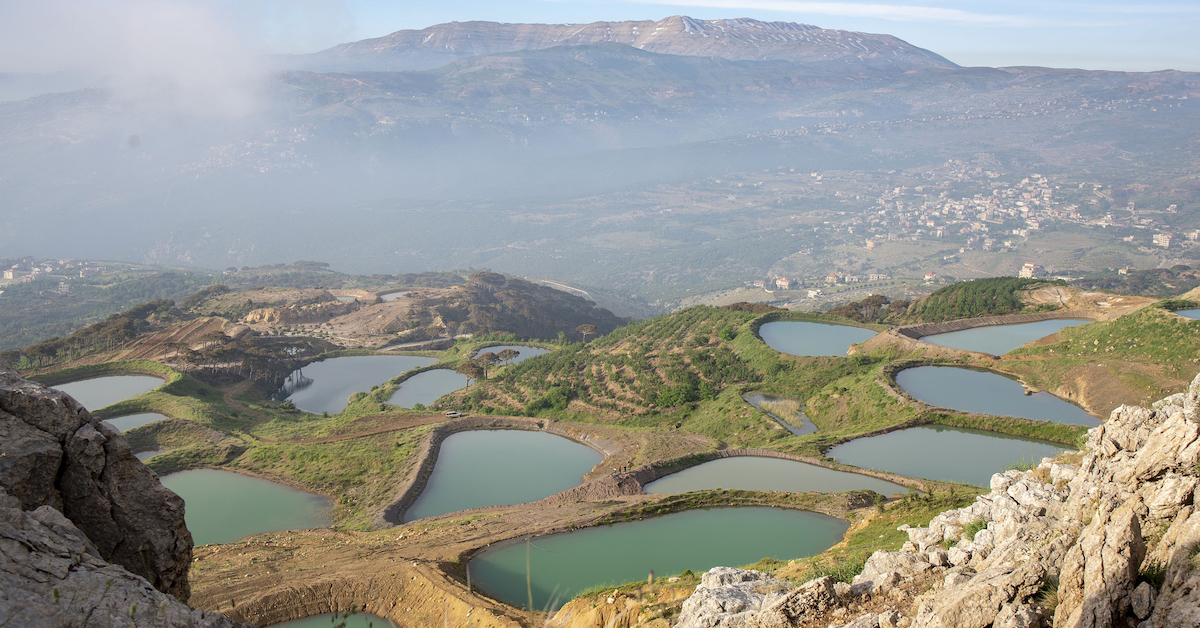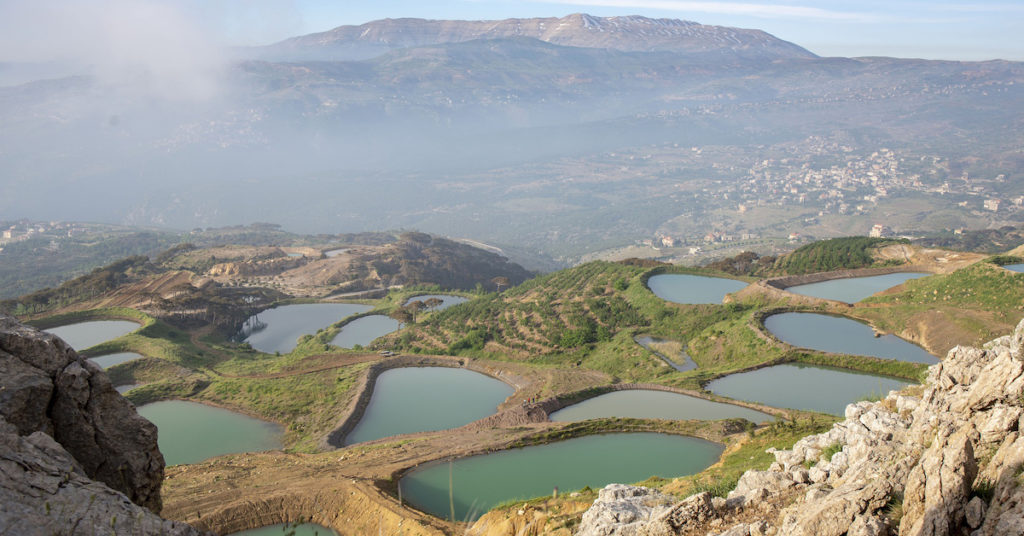
Lebanon, as with other countries in the MENA region, is facing pressing and aggravating challenges in managing natural resources in the face of climate change, water and air pollution, deforestation, and energy shortages.
In a previous article in our Cleantech series, we’ve looked at the landscape of Cleantech regionally and internationally, as we witness increased investment from VCs in innovative startups in the cleantech sector focusing on five industries: water, agriculture, waste management, transportation, and energy.
In this second article, we shed light on the different policies, initiatives, and projects from the different stakeholders in the Cleantech sector while highlighting the innovations in our startup community of entrepreneurs that are using these challenges to create solutions that are sustainable, scalable and profitable.
What makes cleantech an attractive sector in Lebanon?
According to IDAL, the forecasts for the MENA region are alarming: energy demand will increase by 114% by 2050, along with an increase in waste production of 135 million tons per annum. Such challenges require significant joint efforts from the public and private sectors to address them in an unconventional ‘out-of-the-box’ manner. Strategies and plans developed by the government are necessary but insufficient as stand-alone. They require innovative practices, cross cutting over different sectors, rather than operating in silos. The Cleantech sector looks at how technologies and solutions can address water scarcity, pollution, increasing waste, greenhouse gas emissions, CO2 emissions from transportation, and energy scarcity.
On the hand, Lebanon has a well-developed entrepreneurial scene, second in place among the Arab region in terms of values and deals. Around 4 in 10 of the adult population in Lebanon is either starting or running a new business or running an established business. Most of the startups and investments are in the fields of technology as in software and fintech, with shy appearances in other sectors such as agriculture and environment.
When it comes to agriculture and the environment, the Cleantech sector is crosscutting both, including water, waste, and energy. Developing solutions that address challenges in these sectors requires a careful understanding of the governance of these sectors, who works on what, support from international organizations and engagement of the private sector in operation and management.
Here’s an overview of these 3 sectors, what has been done, the guiding policies, the opportunities that challenges in these sectors represent and the startups in our communities that are already working in the sector.
Solid Waste Management
Solid Waste Management is simply about managing waste from its production to its final disposal, mainly changing it to be used as a valuable resource. It includes different activities: sorting, storing, collecting, transporting, processing and disposal, compliant with the public health, economic and engineering standards.
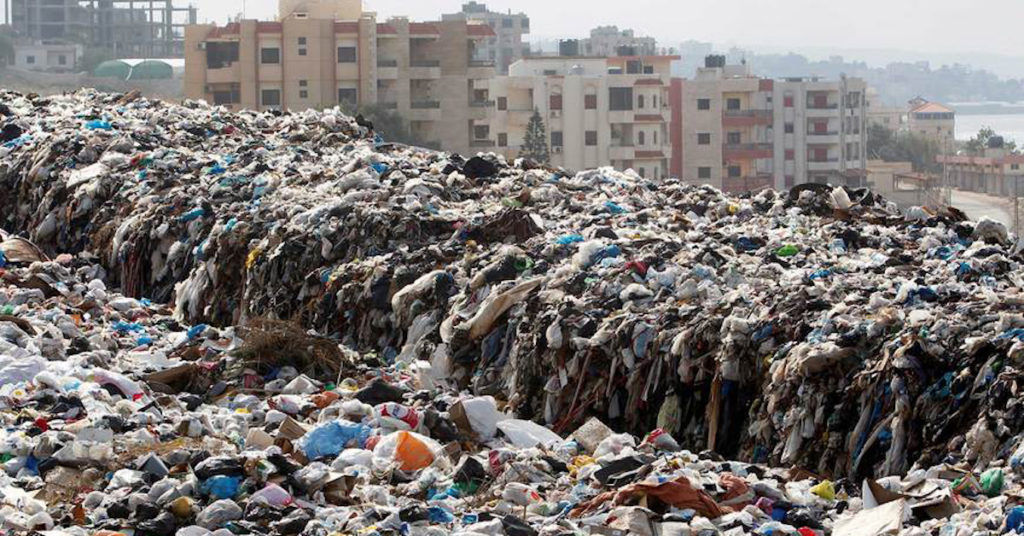
Piles of garbage are seen in Jiyeh, south of Beirut, Lebanon, Nov. 29, 2017.
The Famous Garbage Crisis
In Lebanon, the sector has gained wide controversy across the country given the garbage crisis that occurred in 2015. In response, the American University of Beirut established the AUB Solid Waste Management Task Force to address the behavioral, technical, health and environmental aspects of the crisis, developing the Guide to Municipal Solid Waste management in 2015. In parallel, the Waste Management Coalition was formed including a group civil society organizations, independent experts, and environmental activists in Lebanon, advocating and working for sustainable waste management in Lebanon whilst mitigating the environmental and health hazards associated with it.
On the Policy side, the Law 80/2018 charged the Ministry of Environment to develop the integrated solid waste management plan, a roadmap for which the strategy awaits the final approval of the cabinet.
The policy paper, submitted to the Cabinet, indicated 6,500 tons of municipal solid waste (MSW) per day – namely 52.5% organic matter; 36.5% paper, cardboard, plastic, metal, and glass; and 11% inert and other materials. The waste is 50% disposed of in uncontrolled dumpsites, 35% in sanitary landfills (Bourj Hammoud, Ghadir River estuary, and Zahle); and around 15% undergo material recovery, sorted into recyclable or re-usable forms.
The same paper also stated that a national commission for waste management was to be formed, under the supervision of the Minister of Environment, and including 13 members in total, representatives of Ministries (Environment, Interior and Municipalities, Industry, Finance, Public Health, OMSAR, CDR) along with 5 representatives from the private sector (ALI, Economic and Social Council, Federation of Chambers of Commerce) and 13 in total from professional orders, civil society, and academic sector.
One man’s trash is another man’s treasure
While effective solutions are far from being implemented on a national level, several entrepreneurs are already working to innovate solutions that have a wide impact, alleviating the severity of waste mismanagement while also being a successful business.
A brilliant startup that has received international acknowledgment is FabricAid, a social enterprise that has worked on eliminating fabric waste by creating a smart and wide network of collecting, sorting and resale of clothes.
Another startup – Live Love Recycle has used its initial widespread social platform to create a mobile application to simplify the sorting and collection of recyclables.
Chemrec is another example of a startup that has designed a smart machine used to collect used cooking oil from households to be converted into sustainable biodiesel.
Compost Baladi is a social startup that helps provide waste management products and services for municipalities, commercial establishments, households, restaurants and academic institutions allowing them to recover valuable resources from bio-waste. The founders have also developed CubeX, a home-scale wastewater and food waste treatment system that allows households in rural and suburban areas to process all of their organic waste effortlessly on-site.
Another startup that is being developed – Underconstruction, has innovated a way to recycle a combination of water and plastic, to be used as a durable and sustainable alternative construction material.
Water and Wastewater Management
Different studies and assessments have been conducted on water availability and management in Lebanon over the past three years confirming one fact: Lebanon will soon face critical water shortages by 2020 unless the sector is reformed.
A study conducted by AUB’s Issa Fares Institute for Public Policy and International Affairs indicated that the Ministry of Energy and Water (MoEW)’s statistics show that Lebanon’s annual available water per capita from renewable sources at 926 cubic meters, which is lower than the international benchmark of 1,000 cubic meters, projecting that this will drop to 839 cubic meters in 2015 when accounting for population growth but not the influx of refugees.
A Growing Water Shortage
A recent study conducted by Fransabank forecasted that Lebanon would face a growing water shortage in the coming years, with demand soaring from 1.5 billion cubic meters in 2015 to 1.8 billion in 2035, thereby pushing up the water deficit from 291 to 610 million cubic meters during this period, confirming more water stress and shortages if business continues as usual.
When it comes to water use, the Ministry of Environment estimated in 2010 that out of the total water withdrawal estimated at 1,310 M cubic meters, 60% was utilized for agricultural purposes, 29% for municipal use and 11% for the industry.
The share of water withdrawal for agriculture was forecasted to decrease in the coming years and diverted for municipal and industrial use. Recycled irrigation drainage is only at 12.6% and reused treated wastewater at 0.2%. With the changes in weather, the Climate Change Unit estimates the total volume of water to reduce by 6-8%, the snow cover to shrink by 40% and drought to occur earlier by 15-30 days, all of which will negatively impact agriculture, and aggravate the existing water shortage putting water resources under further stress.
In addition to the climate change risk, the increasing levels of pollution are adversely impacting rivers, springs and groundwater, with contamination from raw sewage and other wastes (industrial and domestic) without proper regulation from the government. Also, in rural areas, the contamination is due to the infiltration of pesticide and fertilizer residues leading to further environmental degradation.
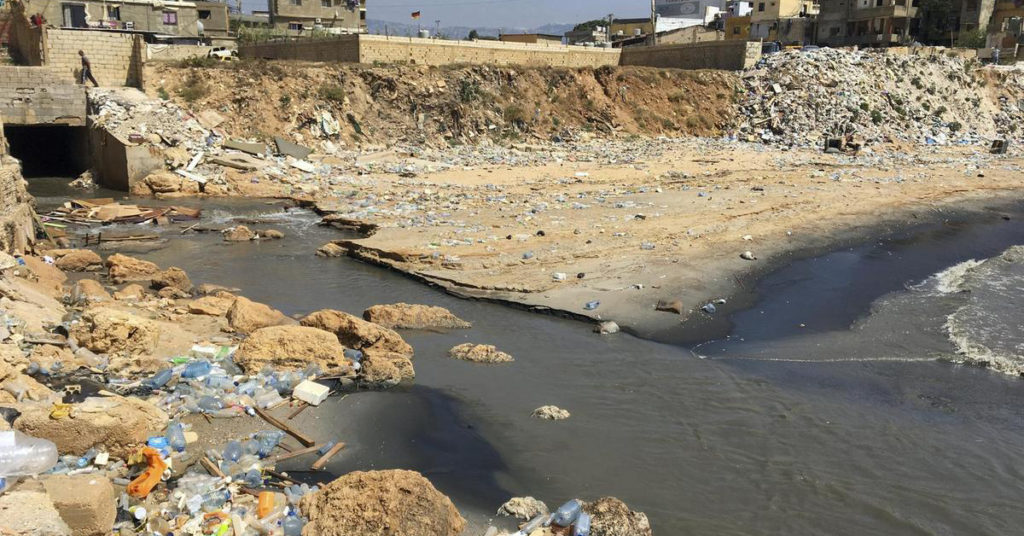
Sewage flows into the Mediterranean Sea near Ouzai, south Beirut, June 28, 2018.
Water Mismanagement Causes Aggravations
The Ministry developed the ten-year plan “The National Water Sector Strategy” for 2011-2020 to optimize the water resources and enable better management. The strategy was approved in 2012. However, when in preparation, the strategy was based on a forecasted population of 5.3 million in 2020 but the influx of refugees in 2015 brought up the figure, in the same year to an estimated 5.9 million inhabitants, exceeding the target in 2020. The Strategy was being updated and fine-tuned in 2019 with the support of the Lebanon Crisis Response Group, through collecting data and analysis on water and wastewater services.
Along the same lines, the “Water Law” issued in 2000 merged the different water authorities into four Regional Water Establishments in Beirut-Mount Lebanon, North, Bekaa, and South. The latest regulation pertains to Law #48 issued in September 2017 and approved by the Council of Ministers with regards to regulating Public-Private Partnerships, approved within the framework of the Water Code and sent to Parliament for ratification.
Despite such efforts, the study conducted by AUB IFI’s in 2015, argued that the water problem was not just related to shortage and availability in the long term, along with the impact of climate change, but that it was also about the mismanagement of the resources and lack of transparency in the practices carried by the different sector stakeholders. The study highlighted the overlap in the roles and responsibilities within the different governmental institutions, the irregular permits provided for well digging and over-abstraction, lack of national water information data, absence of clear budgeting, and human resources-related problems as the main challenges leading to the mismanagement of the water sector.
Water Challenges Bring Innovation Opportunities
Berytech has been working to guide innovations towards the water sector through many of its competitions and has partnered with cewas Middle East to allow entrepreneurs to build a water, sanitation or waste idea into a business.
Innovations that are finding their way outside of the lab through Berytech’s programs include C Green, a startup that is transforming sludge, the solid part obtained at the end of the wastewater treatment, into local organic fertilizer according to FAO guidelines by using a special process for the treatment.
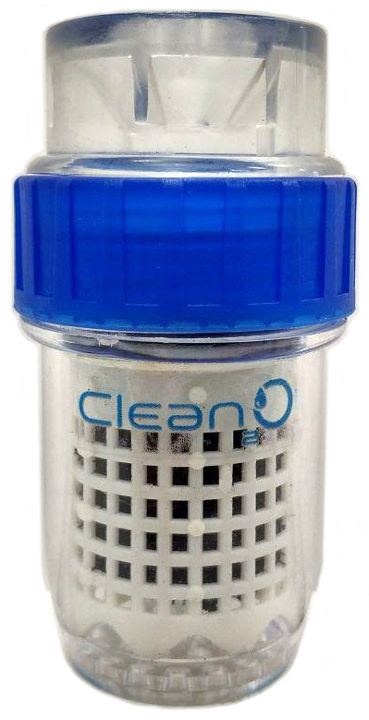
Startups like Clean2O are working to design products that make water safe for cooking or drinking anytime, anywhere. They are currently selling their ‘Pure by Clean2O’ product which is a filter that gets connected to the conventional tap in your kitchen and toilet to make water safe for cooking, making coffee, washing fruits and vegetables, and washing your face. Another device that is under progress is a filter that can get connected to conventional water bottles and can make natural water sources (rivers, lakes, rainwater, groundwater) drinkable for people that have no access to clean drinkable water.
Renewable Energy
Renewable energy in Lebanon accounts for almost 4% of the total electricity production in the country, mainly hydropower and to a limited extent solar PV. The total installed capacity of hydropower plants is 280 MW and about 25 MW PV systems for electricity production.
PV-based electricity generation and water heaters are an increasingly attractive alternative to diesel-based back-up generators to help households cover chronic disruptions to the power supply and reduce bills. The remaining, which is significantly prevalent is generated through imported fossil fuels.
On the Policy level, the Lebanese Government has committed to increasing the percentage of renewable energy sources to 12% by 2020 by improving access to renewable resources. The National Energy Efficiency Action Plan (NEEAP) for 2010-2015 was developed, in addition to the National Renewable Energy Action Plan (NREAP) 2016-2020. Along the same line, the Government also committed, in the Paris Conference on Climate Change, through the Intended Nationally Determined Contributions (INDC) to increase the percentage to 15% Renewable Energy by 2030, and 3% reduction in power demand through energy efficiency. Moreover, in September 2018, a further commitment was acquired from the Government, through its participation in the Climate Vulnerability Forum Virtual Summit 2018, to set a new target of 30% of the nation’s electricity and heat in 2030 to be sourced from renewable energy.
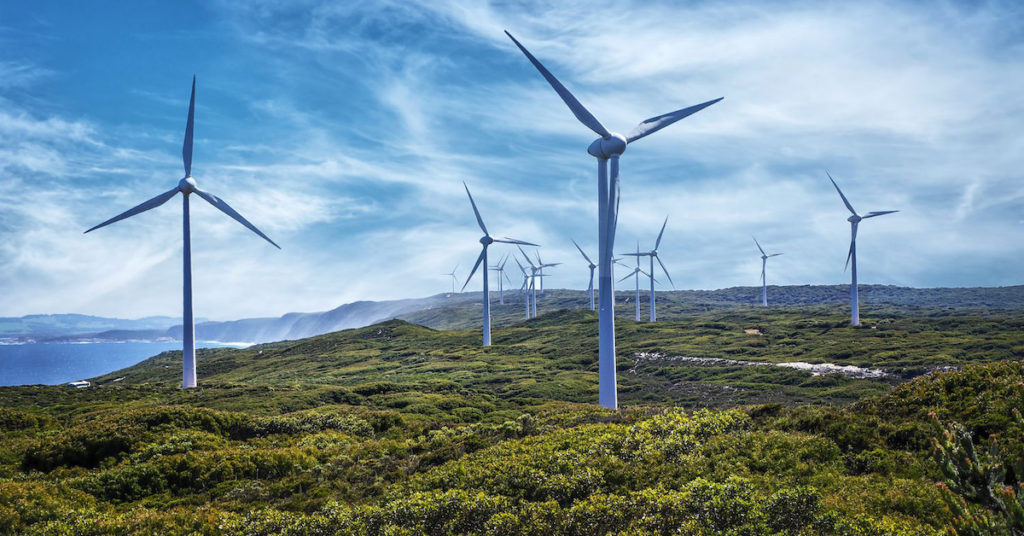
Solar, Wind, and Bioenergy
When it comes to renewable energy sources, Solar PV is an already established sector in Lebanon and the Government is working towards signing Power Purchase Agreements (PPAs) with the private sector for the construction and operation of utility-scale solar PV farms.
Lebanon’s target for 2020 is to reach 1 million square meters of installed collectors. The Wind Energy sector is new in Lebanon, but the Lebanese Government signed the PPAs in 2018 with three private developers to build and operate three wind farms totaling 226 Megawatt (MW) in the northern Governorate of Akkar. The wind farms are slated to become operational in 2021.
Bioenergy is another option and component of the chain and offers various synergy potentials with other sectors such as water treatment and waste management. However, it is still absent from the Lebanese government’s long-term plans.
Support, Loans, and Funds in the Energy Sector
To support the government in achieving its energy targets, the Central Bank of Lebanon launched the initiative: National Energy Efficiency & Renewable Energy Action (NEEREA), a financing mechanism to boost Renewable Energy, Energy Efficiency, and green buildings. This tool provides a wide range of soft loans through commercial banks with long repayment periods, grace periods and low-interest rates.
UNDP has worked extensively on supporting the renewable energy sector, through its Country Energy Efficiency and Renewable Energy Demonstration Project for the Recovery of Lebanon (CEDRO), which was launched in 2007 to complement the government’s reform strategy in the power sector and supporting integrating green practices in construction through energy efficiency and renewable energy applications. Today, the project is in its fourth phase, with the main objective of increasing the application of renewable energy and energy efficiency systems across economic sectors: commercial, industrial, and utility scale, as well as launching a pilot project for bioenergy sourced heating on a village scale.
The sector has also attracted the interest of different donors such as the European Union that recently launched a call for proposal to support entrepreneurship and job creation in the renewable energy and cleantech sectors.
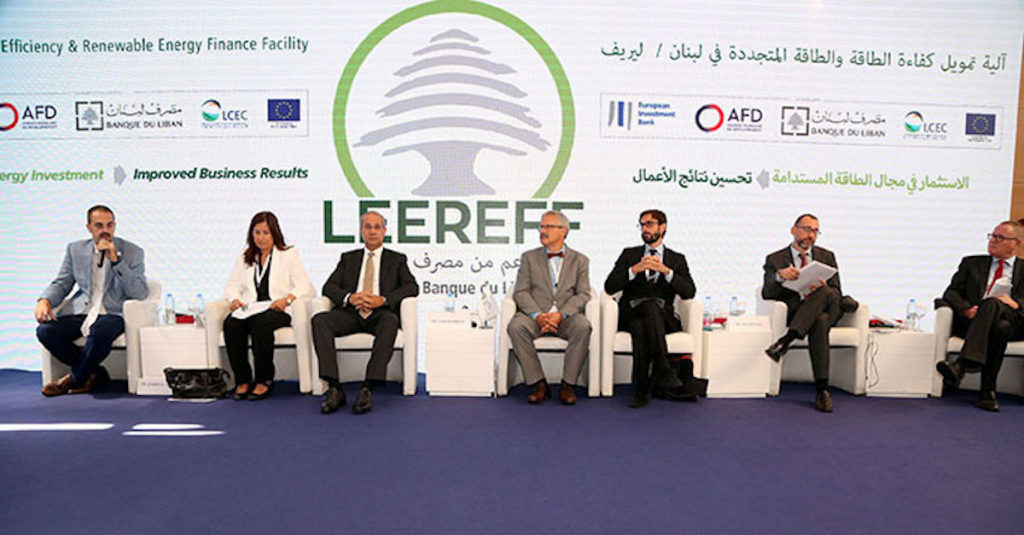
The European Union has been also focused on improving the enabling environment through enhanced access to finance and financial incentives for adopting renewable energy technologies. The European Investment Bank (EIB) along with Agence Française de Développement (AFD) launched in 2018 the Lebanon Energy Efficiency and Renewable Energy Finance Facility (LEEREFF) to finance sustainable energy investments in renewable energy, green buildings, and energy efficiency in businesses and industry for a total budget of 80 million Euros. Companies wanting to invest in sustainable energy or green buildings can acquire a loan from committed private banks and pay subsidized interest rates of 2% on the LEEREFF loans, which have a tenure of 14 years plus a grace period of four years. These loans finance up to 80% of the project’s investment cost.
Other financing mechanisms have also been provided by the European Bank for Reconstruction and Development (EBRD) through Bank Audi’s Green Economy Financing Facilities (GEFF) loans at 2.25% interest rate and ranging between $1,000 to $20 million.
Through funds from the SIDA, ESCWA launched “Regional Initiative for Promoting Small-Scale Renewable Energy Applications in Rural Areas of the Arab Region”. The main objective of the project is to improve the livelihood, satisfying energy needs, economic benefits, and social inclusion and gender equality of Arab rural communities, particularly marginalized groups. The project will work on integrating small-scaled Renewable Energy technologies in rural areas, implementing a pilot project in North Lebanon within the agro-food sector demonstrating the impact that such technologies may have on the livelihoods of the rural communities.
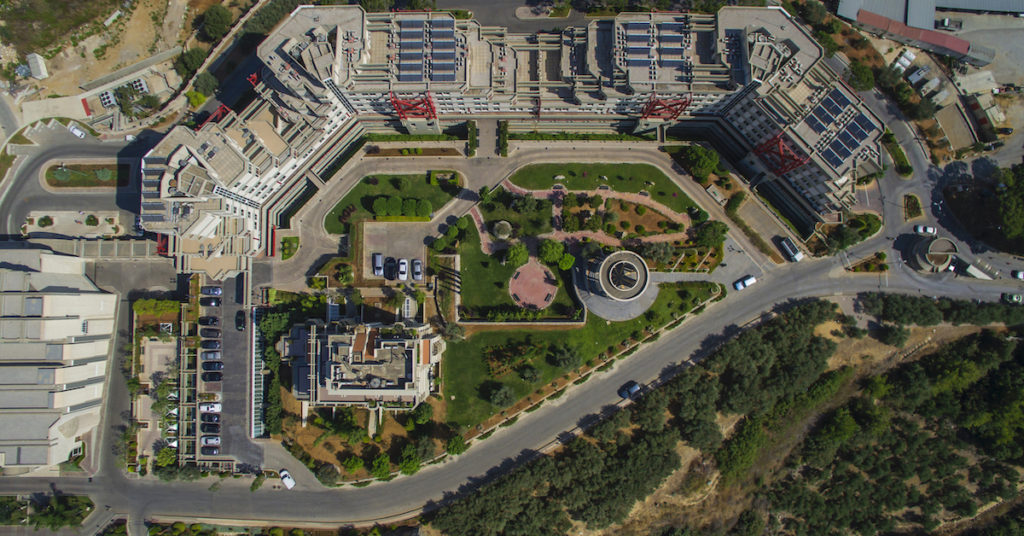
Harnessing the Power of Renewable Energy
Ventures in the Berytech community like YelloBlue have been pioneering in making renewable energy more accessible both to the public and to institutions. Their model covers the conversion process into solar energy at all phases from consultancy to design, to procurement and maintenance.
Energy24 has developed a technology that allows the effective stock and management of electrical power to provide up to 60% savings in comparison to using a generator while avoiding pollution, noise and Co2 emissions.
Catalyzing Innovations in Cleantech
Beyond water, waste and energy, the Cleantech sector includes innovations in transportation that we covered in-depth in this article and agriculture for which Berytech has dedicated an entire accelerator program: Agrytech.
It is because of the success of the model of the Agrytech program funded by The Kingdom of The Netherlands, that Berytech has decided to replicate the model for Cleantech and launch Cleanergy – a program developed not only to catalyze innovation in clean technology but also work to advance it across all of its 5 relevant sectors in Lebanon. Learn more about the Cleanergy Accelerator Program.


